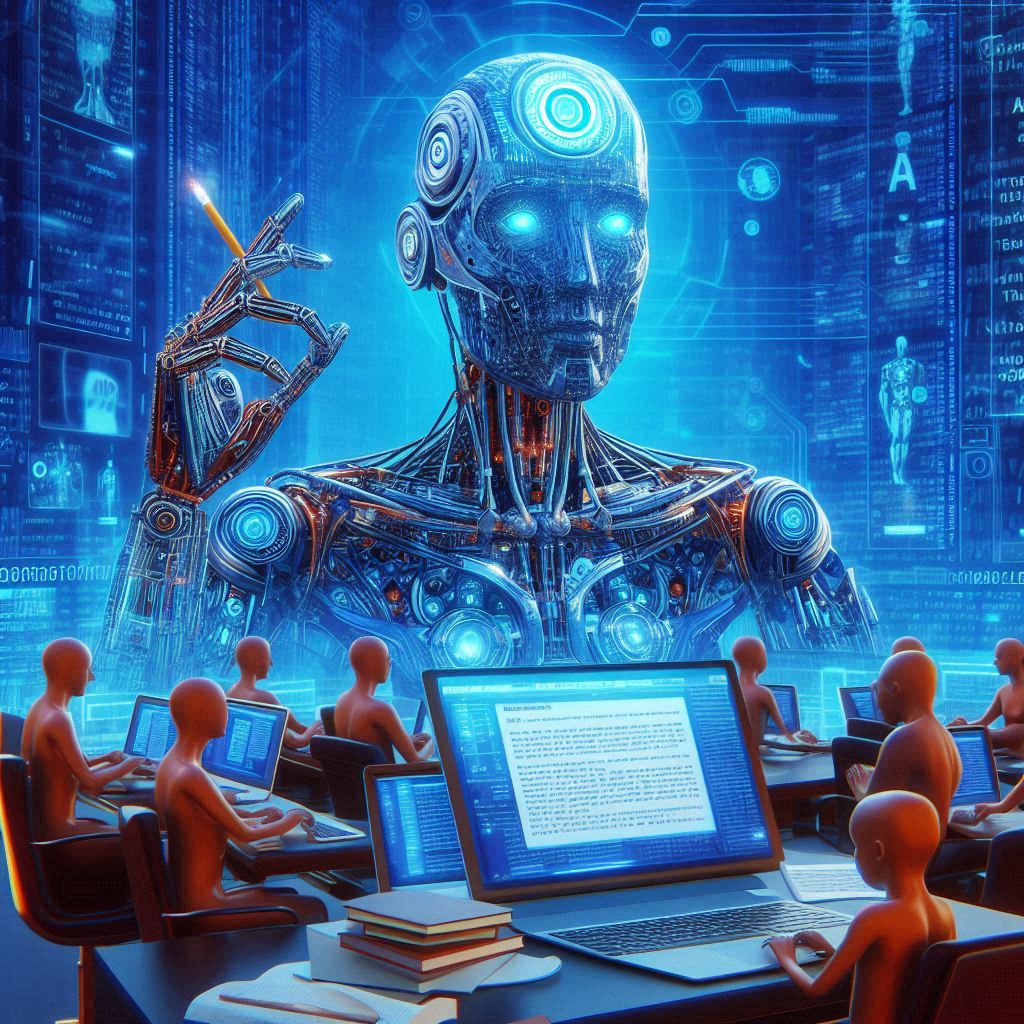Introduction: The Rapid Rise of AI in Content Creation
Artificial intelligence (AI) has transformed content creation, from the marketing industry to journalism and beyond. AI-generated content, once a novelty, now powers everything from product descriptions to social media posts, with tools like ChatGPT and Jasper AI capable of crafting entire articles and even personalized emails. But as AI writing tools advance, a big question looms: Will AI replace human writers? Or is there still room for the creativity, insight, and authenticity that only human writers can provide?
The Rise of AI-Generated Content: Will Human Writers Be Replaced? article explores the impact of AI on writing jobs, the advantages and challenges of AI-generated content, and what the future holds for human writers in a world increasingly shaped by AI-driven content.
The Evolution of AI in Content Creation
Early Beginnings of AI Writing Tools
AI’s journey in content creation started with basic automation—grammar checks, simple predictive text, and tools for keyword research. These applications marked the initial phase, enhancing productivity but lacking the sophistication to truly “create” content.
Advancements in AI Writing Models
The field of AI writing saw a significant leap forward with the introduction of advanced models like GPT-3 and GPT-4. These models generate text that closely mimics human language and are capable of creating coherent, long-form content based on simple prompts. As these models improve, AI-generated content feels increasingly human-like, making it harder to differentiate from human writing.
How AI-Generated Content Works
AI-generated content relies on vast datasets and advanced algorithms in machine learning and natural language processing (NLP). Here’s an overview of how it operates:
Data Collection: AI models use extensive datasets, often sourced from billions of words in books, articles, and websites, to understand language patterns.
Training the Model: Using this data, AI algorithms learn language structures, grammar, and common patterns that allow them to generate text predictably.
Content Generation: When prompted, the AI predicts and generates sentences by analyzing patterns in the data, producing coherent and contextually appropriate content.
This ability to create text quickly and efficiently makes AI an appealing tool for companies looking to scale content production.
Benefits of AI in Content Creation
Speed and Efficiency
AI can produce high volumes of content in minutes, dramatically reducing the time it takes to create and deliver articles, emails, and product descriptions. For businesses with tight deadlines or high content demands, AI offers unparalleled efficiency.
Cost-Effective Production
Hiring writers to produce content at scale can be costly. AI-generated content is a budget-friendly alternative, especially for straightforward tasks such as SEO articles or listicles, saving businesses money on labor-intensive tasks.
Consistency and Brand Voice
With AI, brands can maintain a consistent tone across vast quantities of content. This consistency supports brand cohesion and meets the needs of companies with strict style guidelines or high output demands.
Personalized Marketing Content
AI can analyze user data to create personalized content, helping companies tailor emails, ads, and recommendations to specific audiences. This level of customization would be time-consuming for human writers but is manageable and efficient with AI.
Challenges and Limitations of AI-Generated Content
Lack of True Creativity and Emotional Depth
While AI can mimic human language, it struggles with authentic creativity and emotional resonance. AI-generated content often feels formulaic or lacks the unique voice that readers expect, making it difficult to connect with audiences on an emotional level.
Ethical and Intellectual Property Concerns
AI models pull from pre-existing data, which can sometimes lead to unintended similarities with other content. This can raise issues with intellectual property rights and plagiarism, as AI may generate content that closely resembles its sources without intentional attribution.
Difficulty with Context and Nuance
AI lacks true understanding of culture, context, or subtlety. For instance, humor, irony, or regional references are difficult for AI to grasp fully, often leading to awkward phrasing or unintentional misinterpretations.
Human Oversight Still Required
Despite its advancements, AI content usually requires human review and editing for accuracy, tone, and nuance. This limits AI’s autonomy and highlights the ongoing need for skilled human writers to finalize content, particularly in specialized fields.
The Impact of AI on Writing Jobs
With AI tools becoming more mainstream, many writers are concerned about job security. However, the impact of AI on writing jobs is complex and multifaceted.
Redefining Content Roles
While AI can handle basic content production, there remains a strong demand for specialized writing roles. AI is likely to replace some routine tasks, but the need for strategic, creative, and research-intensive writing continues to grow. Roles like content strategist, copy editor, and creative director are still integral to successful content production.
New Positions in AI Content Management
The rise of AI has led to new job categories such as “AI content editor,” “prompt engineer,” and “AI ethics consultant.” These roles require human expertise to refine, review, and ensure that AI-generated content aligns with brand standards and ethical guidelines.
Emphasis on Creativity and Quality
AI excels at repetitive tasks but lacks the ability to produce unique, compelling stories. As a result, companies may place greater emphasis on high-quality, human-driven content that resonates with readers on a deeper level, making creativity and storytelling invaluable assets for human writers.
Will AI Replace Human Writers?
The potential of AI to replace human writers largely depends on the type of content required:
Routine Content: For high-volume tasks like product descriptions, SEO articles, and listicles, AI is a cost-effective solution that can meet tight deadlines.
Creative and Analytical Content: Articles that require unique insights, personal stories, or thought leadership still benefit from a human touch. Human writers bring creativity, authenticity, and expertise that AI cannot replicate.
Specialized Content: Fields like technical writing or medical content benefit from a hybrid approach, where AI handles data-heavy parts and human writers contribute expert analysis and nuanced understanding.
Ultimately, the most effective approach may be a collaboration, where AI manages repetitive tasks and human writers focus on high-value, creative work.
Common Questions About AI-Generated Content
Will AI make human writers obsolete?
AI’s role is expanding, but it’s unlikely to replace human writers entirely. AI excels at producing simple, formulaic content, but it lacks the nuanced thought and creativity required for more complex projects.
How can writers adapt to the rise of AI?
Writers can focus on developing skills that AI cannot easily replicate, such as creativity, critical thinking, and storytelling. By enhancing skills in areas like editing, content strategy, and brand storytelling, writers can stay competitive in an AI-enhanced industry.
Can AI create quality content independently?
While AI can generate high-quality drafts, human oversight is still essential to ensure accuracy, readability, and context. AI serves best in a collaborative role, supporting content creation without replacing human involvement entirely.
The Future of AI and Human Collaboration in Content Creation
As AI technology advances, the dynamic between AI and human writers will continue to evolve:
Blended Content Creation Roles: Writers are likely to work alongside AI tools, using them to enhance productivity without sacrificing quality.
Demand for Unique Perspectives: AI cannot replicate individual experiences or insights, so human writers who bring a unique voice and personal perspective to content will remain in demand.
Higher Standards in Content Quality: As AI-generated content becomes more widespread, there will be increased scrutiny around originality, accuracy, and ethics, further highlighting the need for human oversight.
Conclusion: Embracing AI Without Losing the Human Touch
AI is reshaping content creation, but it is not a replacement for human writers. Instead, AI offers writers an opportunity to collaborate, allowing them to offload routine tasks and focus on more strategic, creative, and analytical work.
For writers, adapting to AI means embracing new tools while honing uniquely human skills like storytelling and critical thinking. The future of content creation will likely be a blend of AI and human input, where AI enhances productivity, and human writers bring irreplaceable qualities that resonate with audiences.
The path forward is not about choosing between AI and human creativity; it’s about finding a balance that serves the reader and reflects the brand’s voice and values.








